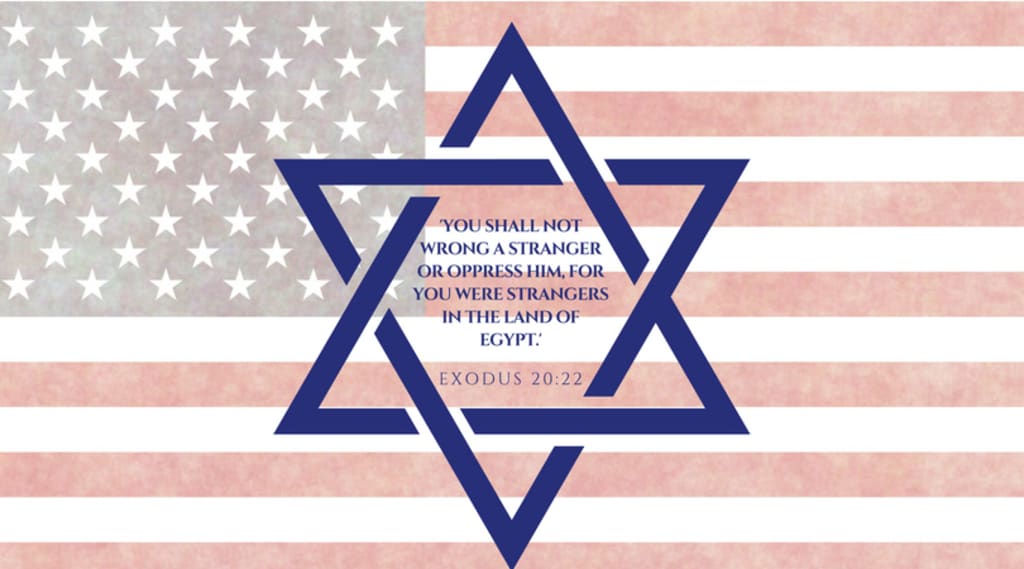Torah for These Times
An American Jew's Voice Concerning 'Zero Tolerance' Immigration Reform

In this essay, I am going to discuss the relevance of the Torah in the times in which we find ourselves. I want to be abundantly clear, that I am not going to speak at the pulpit, nor do I have any interest in converting people to Judaism. Rather, my approach will be largely based in philosophy.
The Torah, not unlike the Jewish people themselves, is a book that is situated in time. That is, the Torah is not a static document, plastered into the edifice of one timeline as opposed to any other. The Torah takes on new meanings in each generation. While it is efficacious to understand the Torah as it was intended for the audience of its time, the simple reality is, that many of the contextual underpinnings behind the Mitzvot (the Commandments, 613 as opposed to just the well known Ten) no longer exist or exist so sporadically in modern times that they need no longer be applied the same way.
No, we may not find ourselves in the Land of Judah or in the kingdom of the Ancient Israelites, nor will we have complete common ground with all Jews in our own time. However, we do have one thing in common, it is the Torah. Our interpretations, our understandings of Halakhah (Jewish Law) will differ from community to community and from person to person but at its heart, there is a reverence in all practicing Jewish communities for the Torah.
Further, I would go so far as to say, that in our day and age the Torah has never been applied more fully. We have moved past animal sacrifices to atone the shedding of blood by a fellow human being and have moved into a more ethical and just Judicial system that takes Torah's teachings at its heart, be it intentional or unintentional.
The communities Jews find themselves in, particularly in the United States and the United Kingdom, have done great things to ensure the safe execution of Jewish practices and Jewish voices in the government. In empires past, Jews were granted varying degrees of practice, in the nations I mentioned and many more, the practice of Jewish values has never been less inhibited.
In the United States, American Jews are called to something we've been on the other side of far too many times. It is the 'Zero Tolerance' immigration policies enacted by the Trump administration. I am personally shocked by the American Evangelical support for such an atrocious act, especially when they claim to adhere to the teachings set forth in the Hebrew Bible. Which, as I will shortly demonstrate, is very clear about the treatment of strangers when they enter your land. For many of us in the American Jewish community, the response to the current immigration policies is abundantly clear.
One cannot fully ignore the overlaps that may be found in the current situation and the situation facing the Hebrews in Egypt under the yoke of Pharaoh. In fact, the story of the Hebrew's escape from the Land of Egypt sets an ethical standard within the Jewish tradition. When Joshua completes what Moses began by leading the people into the Land of Canan and after various military conquests, the Israelites finally had a land of their own. This land would have laws and one of the laws that a community must establish is how they will handle strangers in their land.
The Israelite's task is not new, certainly, the concept of territories being defined by borders is abundantly obvious throughout the history of humanity, however, I will suggest the Israelite approach is unique in a curious way. In Exodus one reads,
"You shall not wrong a stranger or oppress him, for you were strangers in the land of Egypt." - (Exodus 22:20, The Jewish Publicantion Society Tanakh: The Holy Scriptures, The New JPS Translation According to the Traditional Hebrew Text)
This is an extraordinary passage, in my opinion, it is a law enacted by a sovereign group extending a degree of sovereignty to an outside individual or group. What's more, is that this is a law that the Jewish people hold themselves to, it is not explicitly a law set about to concern the interest of the Israelite community as much as it is to extend the 'other' non-Israelite communities and community members. It is a law that is built not necessarily out of social or economic efficacy but empathy.
This is something the Ancient Israelites were able to extend in a time that arguably was much more tribalistic and territorial, it seems as if we can apply the same degree of protection in a day with significantly less territorialism.
Our call as Jews, nay, our call as Americans and citizens of humanity is to do as the Ancient Israelites did in this instance and extend this protection to those entering our land. Our call is even more urgent considering that many of the individuals fleeing their homelands are fleeing persecution and threat of annihilation. The crossing of the Rio Grande is the modern day crossing of the Sea of Reeds (Yes, 'Sea of Reeds', not the 'Red Sea' as it is typically thought) and we must not deliver them out of the hands of one Pharaoh and into the hands of another.
As American Jews, we are members of two covenant communities, the covenant community of the Jews and of the United States. This means that we have been given certain commandments or Mitzvot to follow and in return, we are extended protections and promises. In the Jewish community, these Mitzvot are set out in the Torah and elaborated upon in the Talmud and the Rabbis. In the United States, the laws are set forth through our Constitution and our Constitution, in turn, is interpreted by the Federalist Papers and the judicial systems.
In both cases, the covenant community consents to the governing by the governors. In both cases, the contracts are clear. If the God of the Israelites abandoned his covenants then the Israelites would have no obligation to obey his Mitzvot. If our leaders do not uphold and defend the covenants set forth in our Constitution then we have the right to remove those individuals through a peaceful process and enstate new leaders that will uphold the foundations of our covenant.
I strongly urge both American Jews, and American Christians and Muslims who also belong to two Covenants to take this to heart. More importantly, I strongly encourage Evangelicals to take a stand against the actions being committed by these strangers who have found themselves detained in our strange land.
Bibliography
- Amy-Jill, Levine. "The Old Testament." Lecture, The Great Courses.
- Cherry, Shai. "Introduction to Judaism." Lecture, The Great Courses.
- Exodus. In Jewish Publication Society Tanakh: The Holy Scriptures: The New JPS Translation According to the Traditional Hebrew Text. Philadelphia, PA: Jewish Publication Society, 1985.
- Also the tremendous commentaries by Rabbi Lord Jonathan Sacks
About the Author
Graham Ohayon is in his final semester at the University of Redlands where he will earn his B.A. in Philosophy and in the Spring go on to pursue his Master's in Humanities. In addition, he is the co-editor and chief, as well as founder of The Aristarchus, the Undergraduate Journal of Philosophy at the University of Redlands. He is a proud reform Jew and congregant of Congregation Emanu El in Redlands, CA. He has written on topics ranging from Confucian Ethics to Cartesian Epistemology and Jewish Ethics.
About the Creator
Graham Ohayon
Graham Ohayon is in his final semester at the University of Redlands where he will earn his B.A. in Philosophy. He is also the Editor and Founder of the Undergraduate Journal of Philosophy at the University of Redlands.






Comments
There are no comments for this story
Be the first to respond and start the conversation.